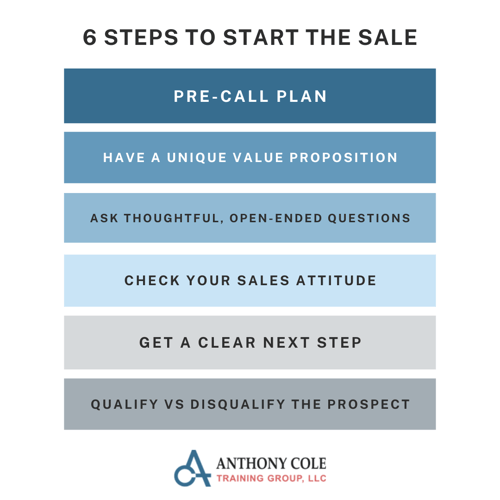Get out of the cold-calling business! Share this video with your people who might struggle with getting introductions. This video is a part of our new series with Mark Trinkle: The 10 Commandments of Sales Success. Today we dive into Commandment #3!
Watch all of the Commandments Here
Hello, this is Mark Trinkle, Chief Growth Officer with Anthony Cole Training Group, and today I am bringing you commandment #3 in our 10 part series that we are calling the 10 Commandments of Sales Success. Now, if you've been following along, you might remember that commandment number one was thou shout always do a pre-call plan, and commandment number two is thou shout always be prospecting. Commandment number three for today is thou shout always remember to ask for introductions.
I'm sure the most hated part of selling universally is having to make cold calls. And ideally, you'd like to get to the point in your career where you have been able to get out of the cold calling business. Listen, we know cold calls don't work. Here are a couple stats for you. One statistic is the average success rate of a cold call landing you a new piece of business. It has been estimated to be 0.03%, not 3%, not 0.3%, but 0.03%. And several graduate business schools have conducted studies where they've surveyed the C-suite, and the most striking number to me is the number 80%. About 80% of C-suite executives when surveyed said, if they don't know you, if they weren't expecting your call, if no one has referred or introduced you to them, 80% said they're not coming to the phone. They're not calling you back, and they're not replying to your email.
So we use the term introduction instead of referral. And, it's more than just a subtlety. A referral is, "Hey Bob, why don't you call Mary? She runs a business on the other side of town that I think would be a good fit for you. " And introduction, by contrast, is where you have asked someone (a center of influence, a business associate, or a client) to actually introduce you so that when you call your prospect, they're going to know exactly who you are.
And it's really pretty simple. It's very straightforward. You want the person introducing you to tell the target, your prospect, four things.
1. "I would like to introduce you to Mark from X, Y, Z company, and you should take his call."
2. "Mark is a good person."
3. "He's done great work for me, and his firm is very reputable."
4. "After you've spoken with Dan, if it does not make sense to continue the conversation, it's okay to say no. If now is not the right time for you and your company to move forward, I know he would understand and appreciate that a lot."
Now, number four is important, okay? That is a pressure relief valve. It helps the person that you're calling to understand if they're not interested, if your message doesn't resonate, they can simply get off the phone and tell you they're not interested. And it should also be a pressure relief valve for you, and a reminder that you are not there to sell anything and that you can be a good listener. And if your message doesn't resonate, you'll happily move on down the road. That's it for commandment number three. Have a great day selling.




